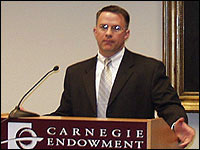Registration
You will receive an email confirming your registration.
IMGXYZ522IMGZYXIn his remarks, Mr. Szymanski described his impressions of China as well as the nature and purpose of the U.S.-China Interparliamentary Exchange. In managing the program’s operations, Mr. Szymanski has organized many Member delegations to and from China, taken over 100 senior aides of the House, Senate, and administration to China, led trade missions to China, and hosted scores of Chinese officials in the U.S. Mr. Szymanski has led 16 staff delegations to China, and through this type of elite exchange, has gained firsthand knowledge about the country.
The U.S.-China interparliamentary exchange is only one of five such exchanges that the United States has with other countries; in addition to China, such a program only exists with Mexico, Canada, the United Kingdom and South Korea. The US-China interparliamentary exchange began in 1999 and had no basis in law or on paper. The first round of exchange took place in fall 1999 when a Chinese delegation came to meet with members of Congress. This round was largely viewed as a failure, part because members of the Chinese delegation were unwilling to engage in dialogue, choosing instead to read directly from scripts, and partly because Congress Members were busy and did not give the Chinese delegation the time and attention they thought they deserved. In spite of this, multinationals such as Boeing, Motorola and Caterpillar urged Chairman Manzullo to continue the exchange. Over two years later, in January 2002, the second round of the exchange took place in China. The American delegation was received with extraordinary courtesy, and the Chinese were willing to engage in open dialogue. The exchanges that followed were equally as successful, and Mr. Szymanski is currently planning the ninth round of talks.
Though the China exchange is very active, it is yet to be institutionalized and codified in law. This could be because of the politically sensitive nature of U.S.-China relations; for many representatives, their constituency views China as an oppressor or as a menace to their jobs. Furthermore, when Members travel to China, they can be criticized for not tending to “more pressing” domestic concerns. Mr. Szymanski noted that many prominent government officials, ambassadors, businessmen, and academics have urged for the exchange to be continued and institutionalized; without such a step, the exchange is continuously at risk. This exchange with China is seen as a model that the United States should duplicate with other countries as well.
Mr. Szymanski’s impressions of China were, overall, positive. Though he remains very concerned about certain developments in China and their implications for the United States, he described the Chinese as gracious hosts. Mr. Szymanski has been to many locations within China, including more sensitive areas such as Tibet and Xinjiang. He felt that the government within China was surprisingly decentralized, and that Beijing was not as controlling and oppressive as the media portrays it. He warned against treating isolated incidents as the norm and emphasized how important it is for people in general, Members in particular, to experience a country in order to understand it.
In short, person-to-person exchanges such as the U.S.-China Interparliamentary Exchange are necessary to eliminate ignorance and thereby improve relations between the two countries. Currently, the American education system does not adequately educate American youth about China, nor does the United States have good programs to promote trade and investment in China. Person-to-person exchanges of all types between Americans and all other nationalities need to increase in order to ensure peaceful relations between the United States and the other countries of the world.
This summary was prepared by Oriana Skylar Mastro, Junior Fellow with the China Program at the Carnegie Endowment for International Peace.
